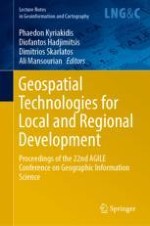2020 | OriginalPaper | Buchkapitel
Future Occupational Profiles in Earth Observation and Geoinformation—Scenarios Resulting from Changing Workflows
verfasst von : Barbara Hofer, Stefan Lang, Nicole Ferber
Erschienen in: Geospatial Technologies for Local and Regional Development
Aktivieren Sie unsere intelligente Suche, um passende Fachinhalte oder Patente zu finden.
Wählen Sie Textabschnitte aus um mit Künstlicher Intelligenz passenden Patente zu finden. powered by
Markieren Sie Textabschnitte, um KI-gestützt weitere passende Inhalte zu finden. powered by
